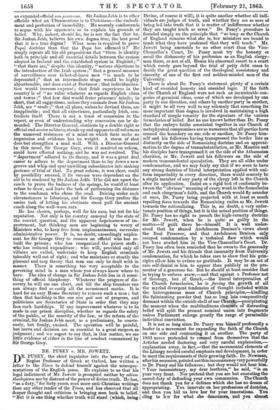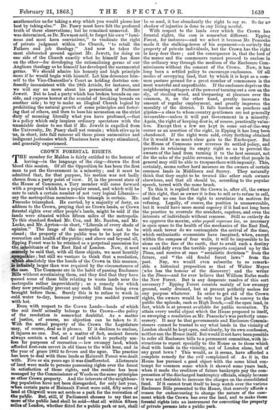DR. PUSEY v. MR. JOWETT. D R. PUSEY, the chief inquisitor
into the heresy of the Regius Professor of Greek at Oxford, has written a letter to the Times to defend himself against the misrepre- sentations of the English press. He explains to us that his legal indictment of Mr. Jowett is prompted neither by odium theologicum nor by distrust of the power of divine truth. Ile has, "as a duty," for forty years, read more anti-Christian writings than any other reader of the Times, and has observed that all deeper thought and criticism is bringing men back to belief. "But it is one thing whether truth will stand (which, being Divine, of course it will), it is quite another whether all indi- viduals are judges of truth, and whether they are so sure of being led into truth that it is matter of indifference whether they are taught truth or error." Dr. Pusey's procedure is founded simply on the principle that "so long as the Church of England remains what she is, her ministers are bound to teach what they have professed that they will teach." Mr. Jewett being amenable to no other court than the Vice- Chancellor's Court, Dr. Pusey must try the honesty or assail the dishonesty of his profession as an English clergy- man there, or not at all. Hence his abnormal resort to a court which rarely goes beyond the trial of petty debt cases to decide the great question of the theological consistency and sincerity of one of the first and noblest-minded men of the University.
There is about Dr. Pusey's statement plenty of a certain kind of onesided honesty and onesided logic. If the faith of the Church of England were not such an inextricable con- geries of germinal ideas, some of which are developed by one party in one direction, and others by another party in another, it might be all very well to say solemnly that something far more important than dogma is involved in maintaining a high standard of simple veracity for the signature of the various formularies of belief. But no one knows better than Dr. Pusey that the embryo faiths associated together in our Church of metaphysical compromises are so numerous that all parties have crossed the boundary on one side or another, Dr. Pusey him- self and his followers having transgressed the border line as distinctly on the side of Romanizing doctrine and an approxi- mation to the dogma of transubstantiation, as Mr. Maurice and his disciples have transgressed it on the side of the Athanasian charities, or Mr. Jewett and his followers on the side of modern transcendental speculation. They are all alike under condemnation, and we may fairly say that if we were to have any strong doctrine of literal interpretation applied with uni- form impartiality in every direction, there would scarcely be a single member of any party of the clergy left in the Church after its application. Insist on a rigid test of conformity be- tween the " obvious" meaning of every word in the formularies and each clergyman's faith, and the Church would fly asunder at once, Dr. Piney being projected with at least as much repellinc, force towards the Romanizing exiles as Mr. Jowett towards the rationalizing. This is, no doubt, a very unfor- tunate position of things, but it is the actual position of things. Dr. Pusey has no right to preach the high-veracity doctrine for Mr. Jowett, when he is quite as guilty in the matter—if guilt there be—himself. It is well under- stood that he shared Archdeacon Denison's views about the Real Presence, and that Archdeacon Denison only escaped condemnation by a technical flaw which would not have availed him in the Vice-Chancellor's Court. Dr. Pusey has often been reminded that he owes to the generosity of Mr. Jowett and his friends that immunity from University condemnation for which he takes care to show that his prin- ciples allow him to evince no gratitude. It may be an act of rare self-denial in him to appear thus publicly as the pro- secutor of a generous foe. But he should at least consider that in trying to enforce anew,—and that against a Professor not of theology, but of Greek, the literal interpretation of the Church formularies, he is forcing the growth of all the myriad divergent tendencies of thought included within the heterogeneous mass of Church principles,—kindling the fulminating powder that has so long lain comparatively dormant within the outside shell of our Chut*--precipitating the moment when the multitudinous elemlets of distracting belief will split the present nominal union into fragments unless Parliament enlarge greatly the range of permissible individual conviction.
It is not so long since Dr. Piney was 'himself professedly a leader in a movement for expanding the faith of the Church on one side and contracting it on another. The party of 1833 never pretended to conceal from themselves that the Articles needed doctoring and very careful explanation,— explanation away, in fact,—that the sacramental elements of the Liturgy needed careful emphasis and development, in order to meet the requirements of their growing faith. Dr. Newman, afterhis secession, pointed outthis inconsistency verypowerfully to Dr. Pusey and his followers; but they would not hear him. "Your inconsistency, my dear brethren," he said, "is on your very front. Nor pretend that you are but executing the sacred duty of defending your own communion. The Church does not thank you for a defence which she has no dream of appropriating. You innovate on her professions of doctrinn, and then you bid us love her for your innovations. You ding to har for what she denounces, mid you almost anathematize us for taking a step which you would please her best by taking also." Dr. Pusey must have felt the profound truth of these observations ; but he remained unmoved. He 'was determined, as Dr. Newman said, to forget his own " lumi- 310US and most keen convictions," to vindicate the right of private judgment within the Church, " to retail the Fathers and job theology." And now he takes the most elaborated ground against Mr. Jowett, for doing on one side of the Church exactly what he himself has done on the other—for developing the rationalizing germs of our Anglican theology as he himself has developed the sacramental germs. We should admire his honesty and high principle more if he would begin with himself. Let him denounce him- self to the Vice-Chancellor's Court as holding doctrine con- fessedly inconsistent with the 28th Article, for instance, and we will say no more about his persecution of Professor Jewett. But to lead a party which has broken bounds on one side, and express horror at the scandal of breaking bounds on Another side ; to try to make an illogical Church logical by prohibitiag the natural growth of some principles and foster- ing that of others, and then to base his accusation on the strict -duty of meaning literally what you have professed,—that is a policy which only inspires ordinary spectators with the amamiable desire to see that if Mr. Jowett is expelled from the University, Dr. Pusey shall not remain ; which stirs up in ars, in short, into full rancour all those pious animosities and indignant jealousies which Pharisees have always stimulated, And generally experienced.































 Previous page
Previous page